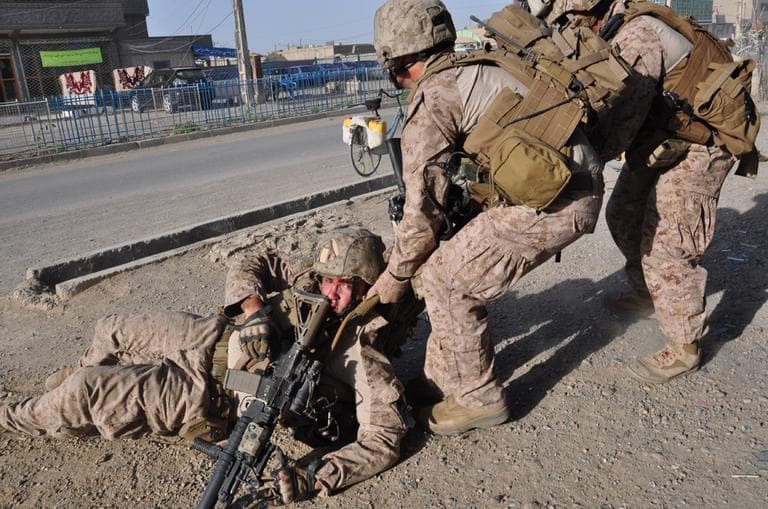Advertisement
A Firsthand View Of A Suicide Bomb In Afghanistan
Resume
By: Alex Ashlock
One of the great things about my job is the search for compelling stories and putting them on the air. Last weekend I happened to see this essay and slide show on the Wall Street Journal web site. It was produced by reporter Michael M. Phillips, and the lead photo caught my eye immediately. A stunned and bruised Marine, looking directly into the camera, hand outstretched, grasped by a buddy. I watched the slide show, read Michael's essay and thought, we have to talk to him about this.
Michael was riding in a convoy of Marines in Zaranj, a town near the Afghan border with Iran. They were piled in unarmored Ford Ranger pickups, just like the one I drive to work every day. Zaranj is thought to be a peaceful town, where there hadn't been any attacks in years. Stores were open, kids were in the streets, and the Marines took that as an indication of a peaceful trip, because when the kids disappear, that can mean something bad is about to happen. But on April 28, 2012, all was calm. Until a man pushed a handcart loaded with explosives and ball-bearings into the road near one of the trucks and detonated it.
There were three men in the bed of the Ranger that was hit. They were all injured but they survived. Another Marine, Master Sgt. Scott Pruitt, a military accountant from Mississippi, wasn't so lucky. There was nothing Navy corpsman Benny Flores could do for him. He bled to death in the front seat. Sgt. Pruitt was buried at Arlington National Cemetery on May 8.
Michael was riding in one of the trucks in front, sitting in the bed looking back, so he saw the explosion and started shooting pictures.
"It was such a jolting experience," he told Here and Now's Sacha Pfeiffer. "The world explodes and suddenly everything is thrown into chaos. My reaction was to take pictures and report. Some of the things that I saw in my pictures, I don't remember having seen. To a certain extent when you are a reporter, your notebook or your camera is a filter between you and reality. It allows you to continue doing your job even as you should probably be running for cover."
- Washington Post: Triage Commander Sees Hasty Transformation Of Afghan Mission
Guest:
- Michael Phillips, Wall Street Journal reporter
- We also have a report from the BBC's Andrew North
This segment aired on May 18, 2012.